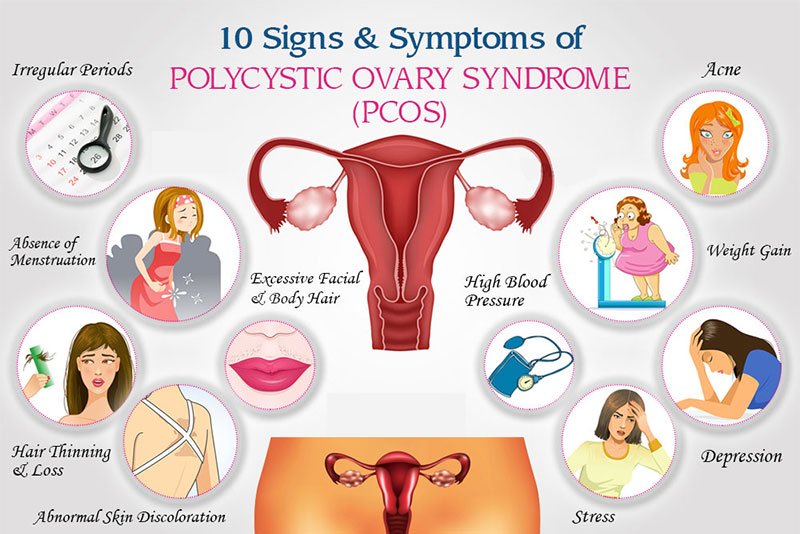Ayurveda For PCOS – Polycystic Ovarian Syndrome
Introduction:
Polycystic ovary syndrome (PCOS) is a condition in which women typically have a number of small cysts around the edge of their ovaries (polycystic ovaries). Polycystic ovaries are ovaries containing a large number of harmless cysts that are no bigger than 8mm each. Many women have polycystic ovaries without having the syndrome (without the symptoms). Some women have the syndrome, but have normal looking ovaries on ultrasound.
What are the causes of PCOS ?
Modern research science says the cause of PCOS is not fully understood. It is still unknown. There are few factors we can consider as probable causes;
- Hereditary – Genetics may be a factor. PCOS seems to run in families, so your chance of having it is higher if other women in your family have it or have irregular periods or diabetes.
- Hormonal imbalance – If there is abnormal secretion of androgens, luteinizing hormone (LH), sex hormone-binding globulin (SHBG), and prolactin. Which may cause to stop ovulation.
- Insulin resistance – Body may have problems in using insulin leading to abnormal blood sugar levels. Which increases the levels of insulin in your body, which increases androgen secretion again leading to hormonal fluctuations.
- Mild inflammation – Women with PCOS have mild inflammation, this type of low-grade inflammation stimulates polycystic ovaries to produce androgens in the body.
What are the Signs and symptoms of PCOS ?
- Irregular periods Amenorrhea
- Variation in menstrual bleeding
- Infertility
- Hirsutism
- Skin changes like Acne, oily skin, or dandruff.
- Obesity
- Hair thinning increased androgen levels may cause male-pattern baldness due to excessive hair fall.
- Patches of skin on the neck, arms, breasts, or thighs that are thick, velvety, dark brown or black.
- Skin tags, Excess flaps of skin in the armpits or neck area.
- Pelvic pain- Few women with PCOS experience dull aching pain in lower abdomen. This is may be due to low-grade inflammation.
- Abnormality in mental health. There may be anxiety or depression, low level of confidence due to change in their physical appearance.
- Sleep apnea – Breathing stops for short periods of time while sleeping, which make you feel tired even after sleeping.

What is the pathogenesis of the PCOS ?
Ayurveda believes that three doshas or forces of life – vatta, pitta and kapha circulate in the body and facilitate all important bodily functions. In healthy individuals, all three doshas are in perfect harmony. According to Ayurveda, any imbalance in the three forces of energies can lead to diseases.
Ayurvedic texts mention the presence of shukra dhatu in both men and women. Shukra dhatu can be correlated with semen or androgens. Shukra dhatu plays a vital role in maintaining the health of the reproductive system. Any imbalance in Shukra dhatu can cause issues related to reproductive health or can leads to infertility.
An imbalance in the doshas can affect the efficiency of the Shukra dhatu. When doshas affect the efficiency of the Shukra dhatu in women, it leads to excess production of male hormones and other symptoms of PCOS such as the appearance of cysts in the ovaries.
How PCOS is diagnosed?
- Blood tests – Your blood is tested for various hormones, Thyroid function test, Lipid and diabetic profile.
- Ultrasound scan – To examine your ovaries, uterus and endometrial linings.

What are the Health Risks of PCOS ?
- Infertility.
- Endometrial Cancer
- Diabetes
- Lipid Abnormalities
- Cardiovascular Risks
- Hypertension
What is the line of treatment at our center ?
In allopathic science there is only symptomatic approach toward PCOS. Treatments include birth control pills to regularize periods, medication like metformin to prevent diabetes, statins to control high cholesterol, hormones to increase fertility and procedures to remove excess hair.
Well Ayurvedic approach is totally different we try to dig out the actual cause of the disease. Our focus is on re-establishing the dosha balance and further correcting the affected dhatu (tissues). Here at Ketav’s Ayush Health Paradise, with ayurvedic Panchkarma and Rsayana therapies we make sure to stop the pathological process first and then rejuvenate the damaged tissues, to provide complete health.
Also healing hands in our PCOS treatment plan played by Yog and Dhyana. We saw patients got their confidence back, more positivity and activeness with regular Yog and Dhyana along with Panchkarma therapies. This kind of approach certainly worked wonder in PCOS cases.
How Yog and Dhyana (Meditation) helps in PCOS ?
Yog and Dhyana (Meditation) are wonderful tools to boost the overall health. And have the feeling of balanced and healthy mind and the body. Here at Ketav’s Ayush Health Paradise we have seen Yog and Dhyana have played an important role in controlling and curing Polycystic Ovarian Syndrome. Anything that makes our minds and bodies relax improves our body’s metabolism and works on boosting the strength of our reproductive system. Yog help to lose weight improve blood circulation to the ovaries and regulate the endocrine glands to balance hormones .The beauty of Yoga is that every Asana concentrates on one or the other part of the body making it very effective in treating specific disorders.
When we talk about meditation, most importantly anyone can do meditation no matter what strength, weight and age of women. We have found it is very beneficial for the mind, body and the spirit.
Regular practice of yog and meditation enhances physical fitness and strength, de-stresses, regulates hormonal balances and rejuvenates you.
We recommend specific yog asanas and dhyana (meditation) for PCOS patients as given below:
- Suryanamskara (salutation to lord Sun)
- Naukasana (boat pose),
- Sarvangasana (shoulder stand pose),
- Bhadrasana (butterfly pose),
- Padmasana (lotus pose)
- Paschimotasana (forward bend pose)
- Balaasna (child pose)
- Sputa bandha konasna (sleeping butterfly pose)
Pranayama is an essential part of yoga. Breathing exercises provide an excellent way to relieve stress naturally. Exercises like Nadi Shodhan (alternate nostril breathing), Bhramri (bee pranayama) and Kapalabhati are all very beneficial in calming the mind. Meditation is reported to have wonderful healing effects on both the mind and the body. This also calms the nerves which help in dealing with stressful medical conditions.
All these help to builds muscles which combat insulin resistance which is very important to manage PCOS. Increases heart rate, provides a cardiovascular workout and leads to weight loss. Promotes hormonal balance, relaxation and brings adrenal and cortisol levels in control thus help in healing stress.
According to Ayurveda, here are some dos and donts for patients of PCOS:
- Minimize the intake of dairy products, including curd and other milk products. Butter milk is an acceptable drink in the day time.
- Follow a natural sleep cycle. Avoid sleeping during the day time and try to get uninterrupted sleep during night.
- Stay away from all kinds of junk food.
- Limit your sugar intake.
- Avoid non-vegetarian food. Though Ayurveda allows an occasional intake of fish.
- Add herbs like garlic, cinnamon, and fenugreek etc in your cooking.
- Opt for herbal teas like, PCOS Tea , Energy Tea etc
- Eat healthy fats like ghee and fresh butter.
Hope this information will give the ray of hope to all those women who are facing difficulties in their life due to PCOS And I am proudly saying that Ayurveda has the answer for these issues.
Panchkarma roots off all the toxins from body and mind, fight aging and gives longevity of life



